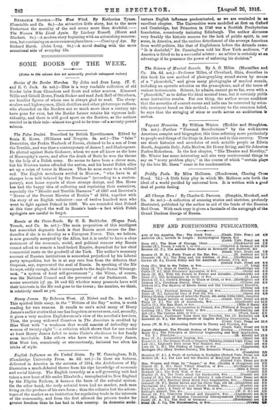English Influence on the United States. By W. Cunningham, D.D,
(Cambridge University Press. 4s. f3d. net.)—In these six lectures. delivered in America in the autumn of 1914, the Archdeacon of Ely illustrates a much-debated theme from his ripe knowledge of economic and social history. The English township as a self-governing unit had taken a new lease of life under Elizabeth ; transplanted to New England by the Pilgrim Fathers, it became the basis of the colonial system. On the other hand, the early colonial town had no market, each man living on the produce of his own farm ; thus the colonies lost the advan- tages of the market as an institution for regulating trade in the interests of the community, and from the first allowed the private trader far greater freedom than he has had in this country. In domestic archi- tecture English influence predominated, as we are reminded in an excellent chapter. The Universities were modelled at first on Oxford and Cambridge, but Princeton in 1746 was a Scottish Presbyterian foundation, consciously imitating Edinburgh. The author discusses very frankly the historic reasons for the lack of public spirit, in our sense, in America, and the curious detachment of the average American from world-polities, like that of Englishmen before the Armada came. "It is doubtful," Dr. Cunningham told his New York audience, "if America is fitted to be a successful arbiter: an arbiter is certainly at an advantage if he possesses the power of enforcing his decision."


























 Previous page
Previous page